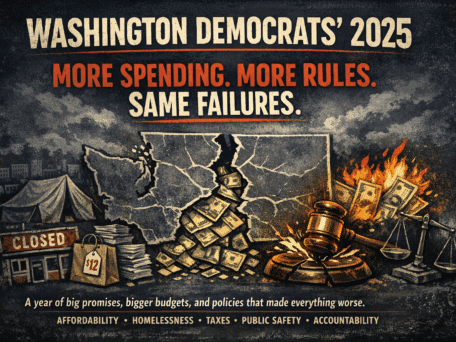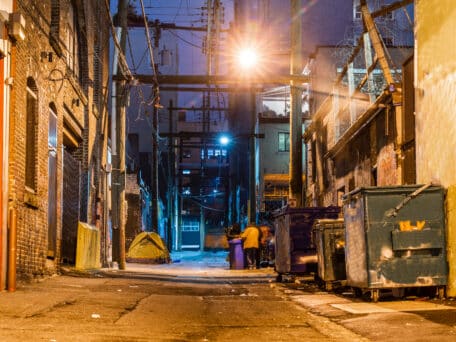Today, we are continuing our series on the Top Ten underreported stories of the year. On Thursday, we pointed out the many way Jay Inslee has broken his no-new-taxes campaign promises and the general pass the mainstream media has given him. The state Supreme Court and its overreach of power/activist rulings is our #9 story.
The state Legislature made historic investments in K-12 education during the 2015 session. Because of that, Attorney General Bob Ferguson filed a brief with the state Supreme Court arguing that the contempt sanctions put on the state due to the McCleary decision should be lifted. The court didn’t agree.
$100,000 a day fines
Instead, in August, the court slapped a $100,000 per day fine on taxpayers for what it viewed as the state’s failure to take necessary strides toward meeting the requirements of the McCleary decision.
The question of how the daily fines would be collected and paid arose following the court’s decision. As the Washington Policy Center pointed out, the problem is that—under Article 8, Section 4 of the state constitution—money can only be disbursed via an appropriation. In other words, in order to “enforce the court’s fine lawmakers would have to vote on appropriations to fine the state.”
“Revenue” means taxes
Of course, it did not take long for Democrat lawmakers to begin suggesting “solutions” to the courts ruling. And, many of these “solutions” were actually just calls for new taxes—or, as Jay Inslee euphemistically put it, “additional revenue sources.”
Democrat state Rep. Jim Moeller—the number three Democrat in the state House—stated that he believed the court’s order is “appropriate” and “should not go ignored.” Moeller went on to suggest that a state income tax is a solution to the problems pointed out by the court.
Inslee followed up, and validated, Moeller’s statements by stating that the court’s order should be respected, but also declining to call the special session the court wanted. Our green governor also claimed the state needed new revenue sources to raise the money—he estimates an additional $3 billion a biennium—to appease the court. Specifically, Inslee claimed that the state would require “spectacular revenue growth” or “some additional revenue source” to meet the constitutional duty which Democrat governors have ignored since 1985.
When the dust settled, lawmakers signaled they would take fine for what it is: a largely symbolic public relations move by the liberal justices bent on a power overreach—again. After all, money can only be disbursed via appropriation by the state Legislature. If lawmakers decide not to appropriate money to pay the fine, then it won’t get paid.
Worst timing possible
That, unfortunately, did not stop the liberal justices on the state Supreme Court from acting like activists rather than interpreters of the law. In September, the state Supreme Court handed down one of its most controversial rulings yet. On the Friday before the Labor Day weekend, the state Supreme Court ruled that charter schools are unconstitutional, deciding 6-3 that charter schools do not “qualify as common, public schools and cannot receive public funding.”
The lefty court’s ruling aligns with a coalition of far-left groups—including the Washington Education Association—that launched a lawsuit against charter schools in 2013. This was in retaliation for Washington voters passing a charter school initiative in 2012.
Charter schools left scrambling
The court’s ruling is the first in the nation – 40 other states have charter schools –to strike down such schools in their entirety. That reality made the court’s ruling still more shocking to onlookers and left officials scrambling to figure out what to do next as over 1,300 public charter school students and their families were left without any security over the future of their schools.
Despite the urging of the Washington State Charter Schools Association, state Attorney General Bob Ferguson, a bipartisan group of 10 legislators and four former state attorneys general to correct its harmful decision, the court announced in November that it will not reconsider its ruling declaring the voter-approved charter school law as unconstitutional. The last option to ensure charter schools have a future in our state is a change in state law. That possibility will have to wait for the 2016 legislative session.
It’s well assured that Republicans would support a change in the law respecting voters’ will and reinstating charter schools. Whether or not Democrats will be supportive is less assured.
While some Democrats have joined Republicans in condemning the court’s ruling, others have cheered it—proving their true priority is special interests rather than education. The 36th District Democrats passed a “resolution” stating their support for the ruling. Revealing Democrat’s hostility, state Rep. Gerry Pollet went as far as to say he used the opportunity of charter school students asking lawmakers to save their schools to teach them about their “privilege.”
If allowing 1,300 children to attend their schools is not enough reason to change state law, Democrats might find more motivation in the fact that the court’s decision “calls into question the constitutionality of a wide range of other state educational programs.” In any case, it’s a mess created by a state Supreme Court that appears to believe telling lawmakers how and what to legislate is an appropriate use of its powers.
The question now is, who will challenge Chief Justice Barbara Madsen, and Justices Mary Yu and Charles Wiggins in 2016?




